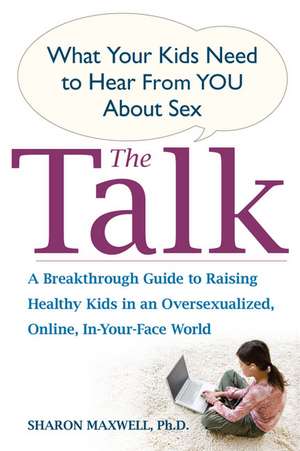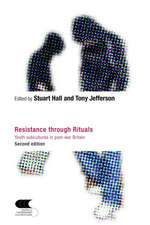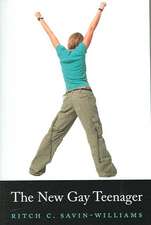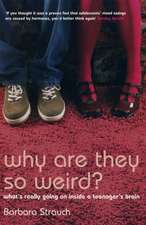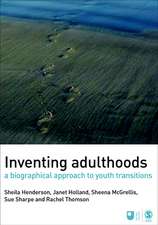The Talk: What Your Kids Need to Hear from You about Sex
Autor Sharon Maxwellen Limba Engleză Paperback – 31 mar 2008 – vârsta de la 18 ani
View our feature on Sharon Maxwell's The Talk. A groundbreaking resource to help jump start an ongoing discussion between parents and teens about sex and sexuality Internet chat rooms, boy/girl sleepovers, reality TV . . . there’s more to “the talk” than ever before. Faced with a culture that pushes our kids to be “sexy” before puberty begins, how do we explain the power of sexuality in a way that promotes healthy, age-appropriate behavior?
The Talk is a breakthrough resource for parents and educators that prepares kids for a hypersexualized world and lays the foundation for ethical sexual behavior that can guide our children from elementary school through college.
Using real-life situations, Dr. Sharon Maxwell demonstrates how dramatically the world of preteen and teen sexual exploration has changed. She helps parents think through the message they want to give to their kids about sexual behavior, and how that message must evolve as their kids get older. Focusing on the importance of love and intimacy, Dr. Maxwell helps parents define their values about sex and gives concrete ways to share those values with teens.
The Talk shows parents how to:
* Set family guidelines for safe Internet use
* Address the social power that comes from looking sexy, and the personal responsibility each of us has to use that power appropriately
* Discuss the moral aspects of sexuality in ways teens will understand
* Help children recognize the difference between feelings of sexual desire and love
* Develop principles with our teens that will help them figure out when it’s okay to be sexual with someone and when it’s not
Dr. Maxwell connects the dots between reproduction, the potent power of sexiness, sexual desire, emotional intimacy, and the spiritual dimension of sexuality. Offering an innovative framework for looking at human sexuality, this book has the potential to change the national conversation on sex education.
The Talk is a breakthrough resource for parents and educators that prepares kids for a hypersexualized world and lays the foundation for ethical sexual behavior that can guide our children from elementary school through college.
Using real-life situations, Dr. Sharon Maxwell demonstrates how dramatically the world of preteen and teen sexual exploration has changed. She helps parents think through the message they want to give to their kids about sexual behavior, and how that message must evolve as their kids get older. Focusing on the importance of love and intimacy, Dr. Maxwell helps parents define their values about sex and gives concrete ways to share those values with teens.
The Talk shows parents how to:
* Set family guidelines for safe Internet use
* Address the social power that comes from looking sexy, and the personal responsibility each of us has to use that power appropriately
* Discuss the moral aspects of sexuality in ways teens will understand
* Help children recognize the difference between feelings of sexual desire and love
* Develop principles with our teens that will help them figure out when it’s okay to be sexual with someone and when it’s not
Dr. Maxwell connects the dots between reproduction, the potent power of sexiness, sexual desire, emotional intimacy, and the spiritual dimension of sexuality. Offering an innovative framework for looking at human sexuality, this book has the potential to change the national conversation on sex education.
Preț: 134.21 lei
Nou
Puncte Express: 201
Preț estimativ în valută:
25.68€ • 26.88$ • 21.25£
25.68€ • 26.88$ • 21.25£
Carte disponibilă
Livrare economică 17-31 martie
Preluare comenzi: 021 569.72.76
Specificații
ISBN-13: 9781583333105
ISBN-10: 158333310X
Pagini: 219
Dimensiuni: 151 x 229 x 16 mm
Greutate: 0.28 kg
Editura: Avery Publishing Group
ISBN-10: 158333310X
Pagini: 219
Dimensiuni: 151 x 229 x 16 mm
Greutate: 0.28 kg
Editura: Avery Publishing Group
Notă biografică
Sharon Maxwell, Ph.D., has been a practicing clinical psychologist for seventeen years. She won a national award from Parenting Publications of America for her series of articles on sex education and recognition for her sexual health curriculum. The Commonwealth of Massachusetts features her work in its brochures on sex education in a DVD on teens and drunk driving. Maxwell lives near Boston.
Extras
Introduction
Who I Am and What This Books Is About
Dear Reader,
An incident on a school playground changed my career and how I understood my job as a mother. Someone else was teaching my seven-year-old about sex, and I wanted it to be me.
As a clinical psychologist for more than ten years I had specialized in and loved working with adolescents and families, but my first job and great passion was mothering. Doing my part in raising the next generation of human beings, providing them with an environment that nurtured whatever unique contribution they would make to the world, defined and continues to define my life. Perhaps itís because I waited so long to have children, or because it almost didnít happen. For whatever reason, like so many parents before me, life acquired meaning and purpose beyond anything I had ever known when I became a mom.
Most of us who take on the job of parenting have a moment in time when we realize that despite our most diligent efforts, our children will be profoundly influenced by factors outside of our control. It might be the first time we put them on the school bus, listen to their sadness and confusion at being rejected by another child, or are taken aback by something they say that we know they didnít learn at home. There is a moment of shock as we realize that our childrenís understanding of the world and of themselves will be fashioned by experiences outside of our control, that our influence is limited and will continue to diminish with every passing year. Logically we understand that this is as it should be, yet we canít help but question whether we have sufficiently prepared them for the world they will encounter.
That moment with my son made it clear to me. When it came to issues of sexuality, not only had I not prepared my son and daughter for a world that was constantly selling sex in a manner that was far from inspiring, but I had not really thought through where I stood with regard to sexuality or how I would want them to understand this important part of their development.
In my private practice I see the impact of the media on teensí sexual attitudes, as well as how unaware most parents are when it comes to understanding how kids are thinking about sex. If I were going to adequately prepare my own children for adolescence I needed to figure out where I stood with regard to sexuality and develop a language to begin that conversation now. My daughter was nine, my son seven.
Already a lecturer on issues of parenting, I began to develop parent workshops on healthy ways of discussing sex with kids. These talks developed into a series of articles for a parenting magazine that led to a national Parenting Publications of America award. The curriculum director for a public school system asked me to develop a sex education curriculum for fifth graders. What a gift that was! I was able to really look at how schools talk to our kids about sex and I found a great deal missing.
Helping kids see how the media influences their understanding of sexuality was missing, a critical oversight in a day and age where most kids learn about how to act sexually from the media. No one was talking to kids about the value of self-discipline: developing the internal muscle to say no to something that feels good is an essential tool in becoming a responsible sexual person. Most importantly, the parents were missing. While schools give information, parents set ethical guidelines for behavior. When it comes to sex, both are needed.
My passion turned to developing a curriculum that gave kids information about sex and included issues like media manipulation of sexual desire and the importance of developing the muscle of self-discipline. Most important, it included parents by showing them how to think through their values with regard to sexuality so that they could continue the conversation at home. Working directly with kids in the classroom as well as with parents and health teachers has been invaluable in continually making this work relevant to the day-to-day realities of families.
As this curriculum became recognized I got calls from religious institutions. Rabbis, priests, and ministers from both conservative and liberal denominations were interested in using my approach to sexuality to address parents and teens in their communities. Each opportunity Iíve had to work with a religious leader has profoundly enriched my understanding of sexuality. Our discussions have enhanced my ability to talk about sex in a way that inspired interest in understanding the responsibility we have to use our sexuality in an ethical way.
As I spoke with more and more parents, it became clear that technology and the clash of cultural and family values presented unique challenges for moms and dads of children of all ages. Parents of younger children are looking for ways to set reasonable guidelines for all forms of media; parents of older children are concerned with how the Internet impacts their kidsí sexual development; mothers want workshops that address issues specific to empowering girls as they navigate the challenges of adolescence.
Each of these interest has turned into workshops, articles, and, ultimately, the chapters of this book.
I have a great suspicion of parenting books. Too often I see parents give up their common sense attempting to try something some ìexpertî says is the right thing to do. Donít use this book that way! Each of you knows more about sex than I could ever tell you. You have that amazing love for your child that will guide you to say the right thing, at the right time. Let the ideas in this book stir up your thinking about sex, about our culture, and about what you want for your child. Talk to your partner or friends. Form a parenting group at your childís school, church, or synagogue. I would love to hear from you and know what works and what doesnít.
It is a great gift to be able to turn oneís passion into oneís work. My passion comes from wanting to be the best mother I can be. I am incredibly grateful to be able to use my education and professional experience to turn that passion into an offering for families.
Sharon Maxwell, Ph.D
Who I Am and What This Books Is About
Dear Reader,
An incident on a school playground changed my career and how I understood my job as a mother. Someone else was teaching my seven-year-old about sex, and I wanted it to be me.
As a clinical psychologist for more than ten years I had specialized in and loved working with adolescents and families, but my first job and great passion was mothering. Doing my part in raising the next generation of human beings, providing them with an environment that nurtured whatever unique contribution they would make to the world, defined and continues to define my life. Perhaps itís because I waited so long to have children, or because it almost didnít happen. For whatever reason, like so many parents before me, life acquired meaning and purpose beyond anything I had ever known when I became a mom.
Most of us who take on the job of parenting have a moment in time when we realize that despite our most diligent efforts, our children will be profoundly influenced by factors outside of our control. It might be the first time we put them on the school bus, listen to their sadness and confusion at being rejected by another child, or are taken aback by something they say that we know they didnít learn at home. There is a moment of shock as we realize that our childrenís understanding of the world and of themselves will be fashioned by experiences outside of our control, that our influence is limited and will continue to diminish with every passing year. Logically we understand that this is as it should be, yet we canít help but question whether we have sufficiently prepared them for the world they will encounter.
That moment with my son made it clear to me. When it came to issues of sexuality, not only had I not prepared my son and daughter for a world that was constantly selling sex in a manner that was far from inspiring, but I had not really thought through where I stood with regard to sexuality or how I would want them to understand this important part of their development.
In my private practice I see the impact of the media on teensí sexual attitudes, as well as how unaware most parents are when it comes to understanding how kids are thinking about sex. If I were going to adequately prepare my own children for adolescence I needed to figure out where I stood with regard to sexuality and develop a language to begin that conversation now. My daughter was nine, my son seven.
Already a lecturer on issues of parenting, I began to develop parent workshops on healthy ways of discussing sex with kids. These talks developed into a series of articles for a parenting magazine that led to a national Parenting Publications of America award. The curriculum director for a public school system asked me to develop a sex education curriculum for fifth graders. What a gift that was! I was able to really look at how schools talk to our kids about sex and I found a great deal missing.
Helping kids see how the media influences their understanding of sexuality was missing, a critical oversight in a day and age where most kids learn about how to act sexually from the media. No one was talking to kids about the value of self-discipline: developing the internal muscle to say no to something that feels good is an essential tool in becoming a responsible sexual person. Most importantly, the parents were missing. While schools give information, parents set ethical guidelines for behavior. When it comes to sex, both are needed.
My passion turned to developing a curriculum that gave kids information about sex and included issues like media manipulation of sexual desire and the importance of developing the muscle of self-discipline. Most important, it included parents by showing them how to think through their values with regard to sexuality so that they could continue the conversation at home. Working directly with kids in the classroom as well as with parents and health teachers has been invaluable in continually making this work relevant to the day-to-day realities of families.
As this curriculum became recognized I got calls from religious institutions. Rabbis, priests, and ministers from both conservative and liberal denominations were interested in using my approach to sexuality to address parents and teens in their communities. Each opportunity Iíve had to work with a religious leader has profoundly enriched my understanding of sexuality. Our discussions have enhanced my ability to talk about sex in a way that inspired interest in understanding the responsibility we have to use our sexuality in an ethical way.
As I spoke with more and more parents, it became clear that technology and the clash of cultural and family values presented unique challenges for moms and dads of children of all ages. Parents of younger children are looking for ways to set reasonable guidelines for all forms of media; parents of older children are concerned with how the Internet impacts their kidsí sexual development; mothers want workshops that address issues specific to empowering girls as they navigate the challenges of adolescence.
Each of these interest has turned into workshops, articles, and, ultimately, the chapters of this book.
I have a great suspicion of parenting books. Too often I see parents give up their common sense attempting to try something some ìexpertî says is the right thing to do. Donít use this book that way! Each of you knows more about sex than I could ever tell you. You have that amazing love for your child that will guide you to say the right thing, at the right time. Let the ideas in this book stir up your thinking about sex, about our culture, and about what you want for your child. Talk to your partner or friends. Form a parenting group at your childís school, church, or synagogue. I would love to hear from you and know what works and what doesnít.
It is a great gift to be able to turn oneís passion into oneís work. My passion comes from wanting to be the best mother I can be. I am incredibly grateful to be able to use my education and professional experience to turn that passion into an offering for families.
Sharon Maxwell, Ph.D
Descriere
In this groundbreaking resource to jump-start the conversation between parents and teens, "The Talk" helps parents articulate their values and talk about responsible behavior in a way that works.
